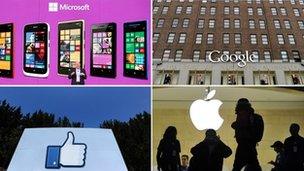GCHQ Prism spying claims: Labour urges PM to launch investigation
- Published

US internet giants at the centre of spying row deny giving agents access to their servers
Prime Minister David Cameron has been urged to launch an investigation into allegations that Britain's electronic listening post GCHQ has been gathering data through a secret US spy programme.
Labour's Keith Vaz said the claims were "chilling" and shadow home secretary Yvette Cooper demanded an inquiry.
According to The Guardian, external, GCHQ had access to data covertly gathered from leading internet firms in the US.
GCHQ said it operated within a "strict legal and policy framework".
The Guardian says it has obtained documents showing that the secret listening post had access to the Prism system, set up by America's National Security Agency (NSA), since at least June 2010.
'Astonished'
The documents were said to show that the British agency had generated 197 intelligence reports through the system in the 12 months to May 2012 - a 137% increase on the previous year.
The newspaper said that the Prism programme appeared to allow the Government Communications Headquarters (GCHQ) to circumvent the formal legal process required to obtain personal material, such as emails, photographs and videos, from internet companies based outside the UK.
Mr Vaz, the chairman of the Commons Home Affairs Committee, said: "The most chilling aspect is that ordinary American citizens and potentially British citizens too were apparently unaware that their phone and online interactions could be watched.
"This seems to be the snooper's charter by the back door. I shall be writing to the home secretary asking for a full explanation."
Ms Cooper called on the prime minister to ask the Intelligence and Security Committee (ISC), which oversees the work of MI5, MI6 and GCHQ, to investigate "the UK's relationship with the Prism programme, the nature of intelligence being gathered, the extent of UK oversight by ministers and others, and the level of safeguards and compliance with the law".
"It is important for the UK intelligence community to be able to gather information from abroad including from the United States particularly in the vital counter terror work they do," the Labour frontbencher added.
"However there also have to be legal safeguards."
'Conflict'
The UK's data protection watchdog, the information commissioner's office (ICO), has raised its concerns with its European counterparts.
It said there were "real issues about the extent to which US law enforcement agencies can access personal data of UK and other European citizens".
"Aspects of US law under which companies can be compelled to provide information to US agencies potentially conflict with European data protection law, including the UK's own Data Protection Act."
A GCHQ statement did not deny the Guardian's story.
A spokesman for the agency, based in Cheltenham, said: "Our work is carried out in accordance with a strict legal and policy framework which ensures that our activities are authorised, necessary and proportionate, and that there is rigorous oversight, including from the secretary of state, the Interception and Intelligence Services Commissioners and the Intelligence and Security Committee."
US spies have been accused of tapping into servers of nine US internet giants including Apple, Facebook, Microsoft and Google in a giant anti-terror sweep. All deny giving government agents access to servers.
But the Prism programme has been strongly defended by James Clapper, director of US national intelligence.
And President Barack Obama said it was closely overseen by Congress and the courts and that his administration had struck "the right balance" between security and privacy.
He also stressed that the surveillance of phone call "metadata" did not target US citizens or residents and government agencies were not listening to telephone calls.
'Serious issue'
Civil liberties campaigners in the UK have said they are deeply concerned.
Lib Dem MP Julian Huppert, a long standing campaigner against the government's proposed Communications Data Bill - dubbed a "snooper's charter" by critics - said he would "raise the issue as soon as possible in Parliament".
The data bill, which would have authorised the retention of every UK citizen's web browsing records, was dropped because the Lib Dems did not support it.
But the home secretary has talked of its importance to national security, following the killing of Drummer Lee Rigby in Woolwich.
The director of civil rights group Liberty, Shami Chakrabarti, said the reports "suggest a breach of trust on the grandest scale... showing contempt for privacy, legality and democracy itself".
She added: "Have those who failed to persuade in the Parliament chamber decided to smuggle blanket surveillance in through the back door?"
Sir Tim Berners-Lee, the inventor of the World Wide Web, said the revelations were "deeply concerning".
He said: "I call on all web users to demand better legal protection and due process safeguards for the privacy of their online communications, including their right to be informed when someone requests or stores their data."
Nick Pickles, director of campaign group Big Brother Watch, said: "There are legal processes to request information about British citizens using American services and if they are being circumvented by using these NSA spying arrangements then that would be a very serious issue."
- Published8 June 2013
- Published7 June 2013
- Published7 June 2013
- Published7 June 2013
- Published6 June 2013
- Published6 June 2013
- Published15 May 2013
- Published15 May 2013